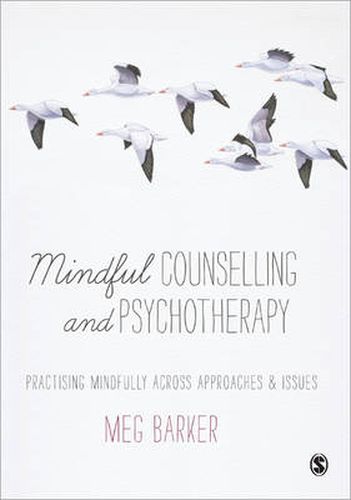Readings Newsletter
Become a Readings Member to make your shopping experience even easier.
Sign in or sign up for free!
You’re not far away from qualifying for FREE standard shipping within Australia
You’ve qualified for FREE standard shipping within Australia
The cart is loading…






This book breaks new ground by relating mindfulness to all of the other therapeutic approaches, across all the common presenting problems in counselling & psychotherapy.
Mindfulness is increasingly recognised as an effective therapeutic treatment with positive research outcomes evaluating its success. Meg Barker responds to our growing consciousness of mindfulness approaches, considering how its principles can inform everyday therapeutic work.
The book:
covers ways in which mindfulness approaches complement each therapeutic approach, as well as any potential conflicts and tensions that might arise
spells out how a mindfulness approach would understand - and work with - common presenting issues, including depression, anxiety and addiction
brings together work on mindfulness from across psychotherapy, science, and philosophy
suggests possible future directions in mindfulness, particularly those which emphasise the social component of suffering.
This engaging and accessible book will appeal to all counselling and psychotherapy students, as well as any therapist looking to complement their own approach with mindfulness theory and practice.
Meg Barker is a senior lecturer in psychology at the Open University.
$9.00 standard shipping within Australia
FREE standard shipping within Australia for orders over $100.00
Express & International shipping calculated at checkout
This book breaks new ground by relating mindfulness to all of the other therapeutic approaches, across all the common presenting problems in counselling & psychotherapy.
Mindfulness is increasingly recognised as an effective therapeutic treatment with positive research outcomes evaluating its success. Meg Barker responds to our growing consciousness of mindfulness approaches, considering how its principles can inform everyday therapeutic work.
The book:
covers ways in which mindfulness approaches complement each therapeutic approach, as well as any potential conflicts and tensions that might arise
spells out how a mindfulness approach would understand - and work with - common presenting issues, including depression, anxiety and addiction
brings together work on mindfulness from across psychotherapy, science, and philosophy
suggests possible future directions in mindfulness, particularly those which emphasise the social component of suffering.
This engaging and accessible book will appeal to all counselling and psychotherapy students, as well as any therapist looking to complement their own approach with mindfulness theory and practice.
Meg Barker is a senior lecturer in psychology at the Open University.